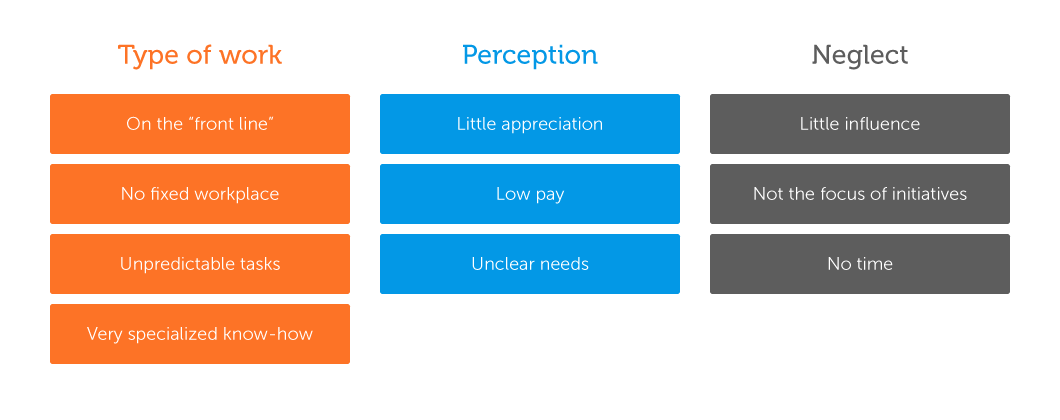Essential jobs – employees below the radar?
Show me similar content
Human Resources
The coronavirus crisis has made obvious a fact that was always true – the value creation on which the historically high prosperity of our society depends is based to a large extent on the work of very specific professional groups. Without these essential jobs in the health sector, retail, production or logistics, life as we know it would grind to a halt. Front-line staff are also vital for companies themselves.
How performance support empowers brick and mortar for the 21st century
Are essential workers disadvantaged?
At the same time, the importance of these professional groups is in stark contrast to the appreciation they receive in “normal” times. Employees in key sectors, such as supermarket staff, don’t just frequently earn much lower wages than those at fixed PC workstations. They are also constantly left to work things out on their own, due to often unpredictable tasks that call for specialist expertise, whether in connection with the new hygiene regulations introduced during the coronavirus pandemic, the launch of contactless payments or the implementation of social distancing guidelines. For certain problems, they are simply not provided with any solutions, as there is no time in their everyday working lives for learning initiatives such as training courses or eLearning. On top of this, people on the front line hardly have any opportunity to offer input. As a result, companies seldom take account of their needs. Yet the lack of support and the associated lack of appreciation lead to frustration. This lowers the quality of work, productivity decreases, and ultimately customer satisfaction suffers.

Common features of essential jobs
HR departments have a special responsibility
The COVID-19 pandemic has created the impression that these shortcomings should be compensated for in the short term through special bonus payments and praise from society. However, to ensure long-term change in the reality of working life for key workers, companies need to adopt a different attitude to these clearly indispensable employees in the medium term.
David Graeber
When crisis situations pass, it is important for us not to forget what they have taught us – for example, which jobs really are essential and which aren’t.
The staff of HR departments and academies have a special responsibility in this regard, as they form the interface between employee needs and management objectives. It goes without saying that such a change isn’t easy and involves a transformation in corporate culture. To nonetheless take the first steps toward an approach that values other people – including beyond the coronavirus crisis – the following five starting points need to be considered:
- Talk to your staff
Find out about the concerns, needs and troubles of your colleagues on the front line. Put yourself in their position. Use this as a basis to put together joint (!) solutions. - Think big, start small
Are there specific measures that are already effective? Conduct small-scale pilot projects and assess the improvement. Constantly develop existing measures, and thus continuously boost their effectiveness. - “Perfection” is the enemy of “good”
Attach more importance to the real benefits for the people “out there” than to organizational and administrative constraints. Be pragmatic – that is the only way to achieve quick results that will also impress the company management. - Learning as a positive side effect
Do not focus on learning, but rather help key workers solve problems in their day-to-day work. Skills will be acquired automatically in the process. - Knowledge is created where it is needed
Support teams of key workers in solving their specific problems together with you. Be a skilled partner and not simply a provider of generic learning content. Help people help themselves.
Putting appreciation into practice
Although as individuals we might not be in a position to resolve fundamental social issues, there are still promising ways of showing the appreciation to key workers that they deserve, whether through monetary benefits or taking account of their needs. After all, they aren’t just a “resource”, but are crucially important to the functioning of our society and companies – and this realization needs to become part and parcel of our everyday working lives.
Show me similar content
Human Resources



